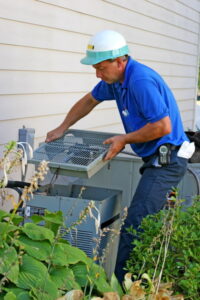The compressor is the single most expensive component of your air conditioning system, and you do not want to ever have to replace it. Often, when a compressor fails completely, it’s a better investment to replace the entire AC system than to get a new compressor.
Your air conditioner has both an indoor unit, or evaporator, and an outdoor unit, or condenser. The compressor is located in the condenser unit and it does the critical job of pressurizing the refrigerant to keep it flowing through the system, taking in heat from your home in the evaporator coils and releasing it from the condenser coils.
So how do you protect your compressor and keep your air conditioner running for as long as possible? Know how to catch problems early! Here are some tips.
Know the Warning Signs
Any time that you have a concern about your air conditioner—if it’s making a weird noise, not performing as well as it should, or behaving oddly in any way—you should get air conditioning repair in Plainfield, IL as soon as possible. Many problems can lead to overall wear and tear and system strain, putting extra pressure on the compressor. Here are some specific indicators that your compressor may be experiencing an issue.
- Clicking or Ticking: When the compressor starts up at the beginning of a cooling cycle, do you hear any clicking or ticking sounds coming from it? There are electrical components in there like relays and capacitors. These sounds can indicate a problem with one of those. Have it checked by a professional so any faulty electrical components can be replaced, preserving the well-being of your compressor.
- Rattling: If you hear a rattle coming from your condenser unit, it’s likely that a part is loose. It may be the fan that pushes air across the condenser coils to disperse the heat. You don’t want it to fly free and crash into the compressor! Get it checked out right away.
- Tripped Circuit Breakers: If a circuit breaker trips on the circuit that powers your air conditioner, it may simply be that you’ve plugged something else into an outlet on the same circuit and that in combination with the air conditioner has tried to draw too much power at once. But if you turn off the unit, reset the breaker, wait half an hour for the AC’s internal circuit breaker to reset itself, and the circuit breaker gets tripped again, don’t keep trying. There are many reasons why this might happen, and a qualified AC technician can accurately diagnose and repair the problem.
- Reduced Cooling: Again, this could have many causes. But you don’t want to keep paying for air conditioning—and in some cases, paying extra as the air conditioner tries harder and harder to provide cooling—without actually getting your home any more comfortable. This is always a situation worth professional attention.
Keep Your Compressor Happy
To lower your risk of having any of these issues develop, there are three things you can do.
First, make sure you have annual professional maintenance done on your air conditioner. Your technician will clean and lubricate it, cutting down on wear and tear, and keep things running smoothly and easily so your compressor won’t be strained.
Second, change your air filter every month during the heat of the summer, and at least every three months when you’re not using it as much.
Third, keep the coils clean and clear, making sure plants don’t grow too close to the outdoor unit and lawn debris doesn’t pile up around it, and washing it gently with a hose if it gets caked with dust or dirt.
When you have any AC concerns, we’ve got your back.
Call J&A today, Sleep-tight tonight!

